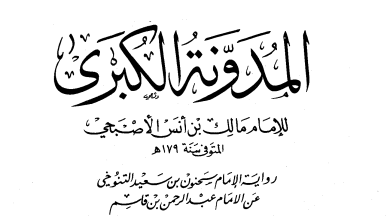Praying 2 Rak‘āts Fajr Sunnah before Sunrise [after Farḍh]
Translator’s preface
The following is an excerpt translated from the footnotes of Āthār al-Sunan [al-Ta‘līq ‘l-Ḥasan][1] of the Ḥadīth master, ‘Allāmah al-Nīmawī[2]. In this chapter, the author first critiques a narration with an interrupted (Munqaṭi‘) chain regarding the permissibility of praying the two Sunnah Rak‘āts of Fajr before sunrise, having already completed the two Farḍh Rak‘āts. He then mentions a similar, but fully connected, chain found in Ṣaḥīḥ Ibn Khuzaymah, Ṣaḥīḥ Ibn Ḥibbān and al-Ḥākim’s Mustadrak[3]. The narration is as follows:
يَقُلْ شَيْئًا “
Abu’l ‘Abbās related to us (who said), al-Rabi‘ ibn Sulaymān narrated to us (who said), Asad ibn Mūsā related to us (who said), al-Layth ibn Sa‘d related to us from Yaḥyā ibn Sa‘īd, from his father (Sa‘īd ibn Qays), from his grandfather (Qays ibn ‘Amr (رضي الله عنه)):
That he arrived while the Prophet (صَلَّى اللَّهُ عَلَيْهِ وَسَلَّمَ) was praying the Fajr prayer so he (Qays) prayed with him (صَلَّى اللَّهُ عَلَيْهِ وَسَلَّمَ). After making Salām (in completion of Fajr), Qays immediately stood up and prayed the two Rak‘āts (Sunnah) of Fajr. So the Prophet (صَلَّى اللَّهُ عَلَيْهِ وَسَلَّمَ) asked him: “What are these two Rak’āts?” Qays replied: “I had not performed them (Sunnah Rak’āts) before [the Farḍh of] Fajr.” On hearing this, the Prophet (صَلَّى اللَّهُ عَلَيْهِ وَسَلَّمَ) remained silent and did not say anything.
To this, ‘Allāmah al-Nīmāwī replied:
This Hadith has also been transmitted via a fully connected chain from Yaḥyā ibn Sa‘īd from his father, from his grandfather, Qays, by the following Hadith scholars: ibn Khuzaymah in his Ṣaḥīḥ, ibn Ḥibbān, who narrates it via this chain as well as a second one, and al-Bayhaqī in his Sunan with the same chain as mentioned above. I (al-Nimawī) say: To begin with, there is a problem in the Samā‘ (listening/hearing of Hādīth) of Sa‘īd ibn Qays from his father (Qays ibn ‘Amr (رضي الله عنه)). Ibn ‘Abd al-Barr states in al-Istī‘āb[4] under the biography of Qays ibn ‘Amr (رضي الله عنه): ‘They (the Hadith scholars) say: Sa‘īd – the father of Yaḥyā Ibn Sa‘īd – did not hear anything (i.e. Hadith) from his father (Qays ibn ‘Amr)’. I (al-Nimawī) say: To add to this also is the fact that this chain is not well preserved (Ghair Mahfuẓ); Asad ibn Mūsā is alone in narrating this from al-Layth from Yaḥyā ibn Sa‘īd. Rather the preserved chain of Yaḥyā ibn Sa‘īd is a Mursal narration (i.e. that which is not fully connected, hence defective). Abū Dāwūd said: ”‘Abd Rabbih and Yaḥyā, sons of Sa‘īd, narrated this Hadīth via a Mursal chain that their grandfather…”[5]. Al-Ḥafiẓ ibn Ḥajar (al-‘Asqalānī) says in al-Iṣābah: ‘And ibn Mandah narrated it via the chain of Asad ibn Mūsā from al-Layth, from Yaḥyā, from his father (Sa‘īd), from his grandfather (Qays رضي الله عنه), and stated: ‘This is a gharīb narration (i.e. the chain contains a solitary narrator at one stage) with Asad (ibn Mūsā) being alone in narrating it with a complete chain.’ Others have similarly held that this Hadith of al-Layth from Yaḥyā (from his grandfather) is Mursal.'[6]
‘Allāmah Yūsuf ibn Mūsā said in al-Mu‘taṣar min ‘l-Mukhtaṣar: ‘And the Hadith which al-Layth ibn Sa‘d narrated from Yaḥyā ibn Sa‘id, from his father, from his grandfather, Qays ibn Qahd.’ Then having quoted the narration stated: ‘This is among those Hadiths which cannot be used as evidence due to the presence of an ‘Illah (hidden defect) in its narrators, which has been expounded upon in larger works.’
But if you were to say that this addition (Ziyādah) [of the chain being fully connected] is from a trustworthy narrator[7], and that the Ziyādah of a trustworthy narrator is accepted unconditionally, as opined by al-Nawawī in many places in his works, then I state [the maxim]: Decisive is the most sound and correct [chain].
[1] Āthār ‘l-Sunan ma‘ l-Ta‘līq ‘l-Ḥasan (Kitāb al-Ṣalah p.187) [2] He is; ‘Allāmah Muḥammad ibn ‘Alī al-Nīmawī [d. 1322 A.H] رحمه الله [3] Ṣaḥīḥ Ibn Khuzaymah (#1597), Ṣaḥīḥ Ibn Ḥibbān (#2525), al-Mustadrak of Ḥākim (#955), the wording being of Imām al-Ḥākim. [4] Imām ibn ‘Abd al-Barr, al-Istī‘āb (1/401). [5] Sunan Abī Dāwūd (#1267) [6] Ḥāfiẓ ibn Ḥajar, al-Iṣābah (5/491) [7] Ziyādat ‘l-Thiqāt is not an agreed upon principle to begin with, some regarded those narrations that fell under this category to be Shādh [isolated], hence rejected.
Compiled by Abu Humayd






